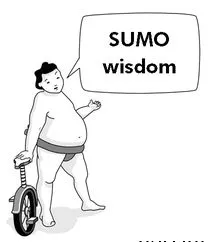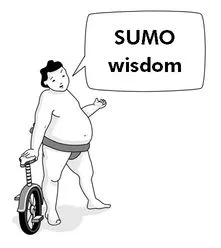![]()
Welcome to Part One
In the first part of the book, we’ll be focusing on Seven SUMO Realities. As the title suggests, there are some realities and basic assumptions about life and relationships that we need to be aware of. We’re not dealing with people in isolation or in a vacuum - there’s a variety of factors that interplay and connect with each other which we need to explore. Once we’ve done that, we can go on to learn more about relating more effectively to people.
If you’re going to get the most out of this book, I urge you not to race through this section - it’s packed with valuable insights that will help inform and illuminate the later material. When you’re building a house, you’ve got to make sure you build solid foundations and that they go deep enough - the same is true with relationships. The Seven SUMO Realities are the foundations for the rest of the book.
Right, well, if you’re sitting comfortably, let’s begin with the first SUMO Reality.
![]()
SUMO Reality Number One
Reality Rules
The reality of dealing with people
When it comes to operating machinery I’m no expert. If there’s something wrong with my car, I’ll open the bonnet with some vague misplaced notion that by doing so, the problem will in some magical way resolve itself. It never does. But if I had the time and inclination I guess I could read a manual and perhaps with a little help be able to fix the odd minor problem. (Indeed, after years of coaching and support I have learnt how to refill my windscreen washer bottle.) As for the more major tasks, a visit to the garage will normally suffice. The garage has both the equipment and expertise to carry out the work. And if the car is beyond repair? Simple - write it off and sell it for scrap.
This is all well and good when dealing with cars, but it’s not quite that simple when it comes to dealing with people problems.
People are different. Relationships are complex. Although there are hundreds of books on the subject of relationships, there is no definitive guide on how best to manage them. Follow three simple steps on changing your spark plugs and, hey presto, it’s sorted out. Follow three simple steps on how to deal with people and the outcome is less certain. There are dozens of different makes of car on the planet - but there are over six billion people. And despite our many similarities, each person is a unique individual. An effective approach on how to deal with a colleague at work or your partner at home may bring about positive results on Tuesday, but try the same approach on Thursday and stand back and watch the sparks fly. Enthusiasm and receptiveness one day: resentment and resistance the next.
Why?
Well, we’re about to explore some of the multitude of reasons why people respond the way they do to situations. The key is to remember that although there will be lots of ideas and insights to help you build better relationships with others, this is not a quick fix manual. Reality rules. Events will happen that you hadn’t expected. You’ll respond to a person in a way you hadn’t planned. Minor problems will escalate into major ones and you’ll be left wondering, ‘Where did it all go wrong?’
Welcome to life - a mixture of joy, excitement, the ordinary, the unusual, sadness, happiness, dreams, despair, success, setbacks - and all these experiences involve people. You see, there is no simple three step formula guaranteed to succeed every time. No magic cure. The perfect relationship doesn’t exist. Reality rules.
How many people do you know who have successfully completed the course ‘How to lose friends and alienate people’?
Hope does exist
However, in the midst of the reality of our circumstances, new possibilities also exist. Things can change. Tomorrow can be different from today. Yes things can get worse, but they can also improve. Some ‘realities’ are not, in fact, permanent. They exist due to poor choices, a lack of awareness, a breakdown in communication - and the good news is all these can change.
I may not be able to change the past, but I can influence the present and in doing so, create a more positive future.
So before we delve into some of the insights and strategies that can help us, let’s remind ourselves of some of the realities we need to be aware of when dealing with relationships.
Here are some realities to be aware of
• Things in people’s past (that neither they or you may be aware of) will influence their current behaviour.
Which means that … you may never discover the root cause of the behaviour, but you will be aware of its current impact.
• People’s emotions fluctuate - sometimes for reasons that are not obvious.
Which means that … people do not respond consistently to situations.
• Not everyone is blessed with ‘emotional intelligence’ (see the work of Daniel Goleman).
Which means that … whereas some people seem naturally gifted in developing interpersonal relationships with others, some find this a huge challenge. What is common sense to one person could feel very unnatural to someone else.
• Some people lack self awareness. They don’t reflect on their own behaviour or understand the impact their emotions have upon them. They fail to recognise their strengths and weaknesses or the impact their behaviour has on others.
Which means that … some of the most challenging people you live or work with are blissfully unaware of the impact they’re having on you.
• We see in others the faults most prevalent in ourselves.
Which means that … we need to resolve issues with ourselves before we can resolve them with others.
• Titles don’t equate to talent. Just because your job title is ‘Manager’ doesn’t mean you can manage people.
Which means that … it’s what happens in practice rather than what’s stated on paper that gives a true reflection of your ability to deal with people.
The most important reality of all - it takes two to tango
When it comes to dealing with what we may perceive as difficult people, the temptation can often be to focus on how we can fix the other person. Perhaps in our eyes they are solely responsible for the challenges we’re facing - change them and you fix the problem. Wrong. The reality is usually very different. As they say, ‘It takes two to tango.’ If you’re experiencing difficulties in any kind of relationship, the blame or problem is not solely with one party. I’m not suggesting there is equal responsibility, but we delude ourselves if we believe we are the completely innocent party. That’s what we’ll be focusing on throughout this book - the problems are not with ‘them’ - they’re with ‘us’. Recognise this reality and you’re more likely to improve your relationships.
The personal stuff
I can relate to the reality ‘we see in others the faults most prevalent in ourselves’. Ouch. Untidiness and collecting clutter seem to be talents I was born with. The phrase ‘a place for everything and everything in its place’ is a total anathema to me. And yet I detest with a passion clutter and untidiness. I work hard at overcoming my own weakness in this area, and over the years have achieved some minor victories - but it remains an ongoing battle. It’s a trait within my personality that I struggle with. Interestingly, the ‘untidiness and collecting clutter gene’ is also prevalent in my wife, Helen, and daughter, Ruth. But unlike me they seem reasonably comfortable living life with it. Their tolerance to domestic chaos (as...


